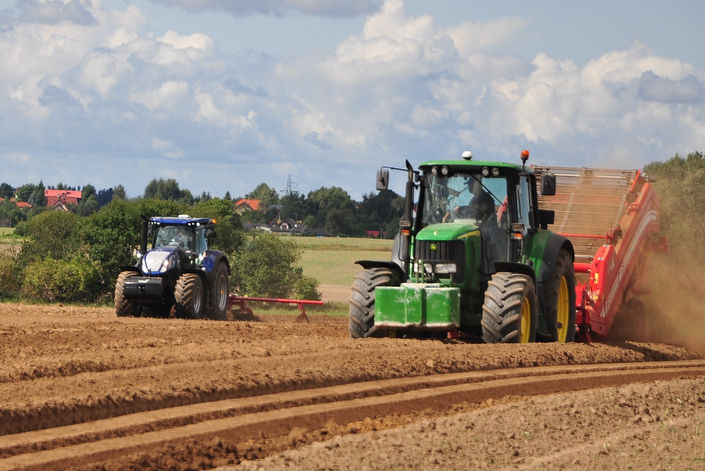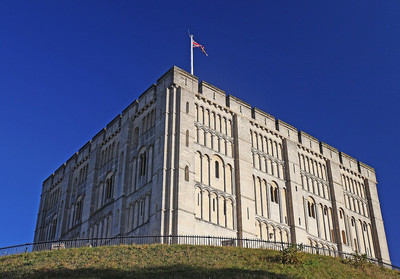An excitement is the Tractor Derby-if you are a geographer or interested in rural pursuits, East Anglia is a place you will know about. If not then let's just assume that on those Suffolk and Norfolk soils, stuff grows or grazes in abundance. Ipswich Town and Norwich City are the only two professional clubs in that region and the Old Farm Derby mirrors (almost) the Old Firm Derby in Scotland!
The two East Anglian clubs have met 145 times with Ipswich winning 60 and Norwich 57, 28 have been drawn. The clubs first met as amateurs in 1902 in the Suffolk and Norfolk League, when the Canaries won 1-0. Today the clubs fought out a 1-1 draw. Norwich became professional in 1905 and Ipswich in 1936, joining the Football League in 1938.They met in the Third Division South on September 2nd 1939, their first "full on" League game, at Portman Road drawing, suitably 1-1. After that league matches were lost to the War.
Nearest professional clubs are Colchester United, Peterborough United and Cambridge United.


The East Anglian Derby: Norwich City v Ipswich
 The East Anglian Derby between Norfolk's Norwich City and bordering Suffolk's Ipswich Town might not be the best known sporting rivalry, but to their fans these fixtures will be the most anticipated of the season. There's no love lost between the Tractor Boys and The Canaries and matches between the two can be closely contested and fiery affairs.
The East Anglian Derby between Norfolk's Norwich City and bordering Suffolk's Ipswich Town might not be the best known sporting rivalry, but to their fans these fixtures will be the most anticipated of the season. There's no love lost between the Tractor Boys and The Canaries and matches between the two can be closely contested and fiery affairs.

The main time that sport does capture the imagination of those that live in the area happens when Ipswich Town and Norwich City go up against each other in football matches. The reason it’s such a big deal is that the two teams are the only professional sides playing the sport in the neighbouring counties.
When the two teams go head-to-head the match is given the nickname of the ‘Old Farm Derby’, which is an amusing and gentle nod to the Old Firm match between Celtic and Rangers in Scottish football. Whilst few would claim that the games have the same potency of the matches that take place in Glasgow and have any number of religious and political connotations linked to them, it’s still a match-up that can cause families to fall out and neighbours to exchange stern words.
Despite the two clubs being the only professional sides in the counties of Suffolk and Norfolk, they haven’t always progressed a the same rate as each other. In fact, the rivalry began when they were both still amateur sides that went up against each other in the Norfolk and Suffolk League at the turn of the twentieth century. Given that Ipswich Town was formed first but didn’t turn professional until after Norwich City, it might help to understand the rivalry if we first look at both club’s histories.
THE FORMATION OF IPSWICH TOWNCHARTERHOUSE!!

Ipswich Town AFC was formed on the sixteenth of October 1878, the brainchild of a local MP named Thomas Cobbold who had played football at Charterhouse School and felt that it was a good way to introduce the sport to the local area. Though they were able to organise matches against the likes of Stoke Wanderers, the club found it difficult to organise competitive games and one lost once in seventeen outings in its second season. That didn’t stop increased interest from locals in the team and sport, however, allowing the club to create a second team. The side also moved to Portman Road in 1884, sharing the ground with East Suffolk Cricket Club.
Ipswich continued to take part in the major competitions that it was allowed to enter, winning the Suffolk Challenge Cup in 1887. The following year the football termed merged with the local Rugby Club to create Ipswich Town Football Club, though still there was no real clamour for the side to turn professional. The first encounter with Norwich City occurred in 1902, with Norwich winning 1-0. Five years later and Ipswich Town helped to form the Southern Amateur League, but still there was a refusal to turn pro. That didn’t occur until 1936 when a local businessman named Leonard P Thompson threatened to create Ipswich United, leading to the club President gathering rival factions together and agreeing that it was time the club became a professional enterprise.
THE CREATION OF NORWICH CITY

How much might the perceived success of local rivals Norwich City have influenced the decision of those in charge of Ipswich Town to turn professional? It’s a little bit like asking how long a piece of string is, but what we do know is that Norfolk club was formed as an amateur side in 1902 and entered the Norfolk & Suffolk League the following year. Originally nicknamed the Citizens, the club earned its moniker of the Canaries by 1905 on account of the fact that locals were known for enjoying canary rearing. Even the national press were using the term by 1907 and it became so widespread that the club adopted its now famous yellow and green shirts ahead of the 1907-1908 season. That all came after the club’s decision to turn professional in 1905, just three years after forming.
As football became a more and more popular pastime in the UK, so too did interest in watching Norwich play the sport grow. They were forced to move away from Newmarket Road because of increased attendances, but the suspension of football activity because of the First World War saw the club get into increased financial difficulty and forced to go into voluntary liquidation in 1917. In 1930, with the War over, the Football League decided to start a Third Division and Norwich City was one of the clubs that they invited to join it. Again, whether the continued success of the Canaries was part of the reason that there was such a clamour for Ipswich Town to turn professional is a matter for some debate, but what is certain is that the Tractor Boys were invited to join the Football League in 1938 and the rivalry has grown ever since.
THE INCONSISTENT DERBY; Whilst the match between the two teams is best-known by the amusing moniker of the Old Farm Derby, it could just as easily be called the ‘Inconsistent Derby’. That’s because the two teams have enjoyed varying degrees of success since they each chose to turn professional, including the fact that they haven’t always been in the same division. At the end of the 1985-1986 campaign, for example, Ipswich Town were relegated from the First Division whilst Norwich City remained in the top-flight. The two clubs were kept apart until the Tractor Boys gained promotion into the Premier League ahead of the 1992-1993 season, allowing hostilities to resume.
Interestingly, the fortunes of the two clubs have tended to mirror each other reasonably well in the years that followed Ipswich’s return to the top-flight. They both dropped out of the Premier League at the same time at the end of the 1994-1995 league season, for example. It was actually Ipswich who returned the soonest, gaining promotion back up at the end of the 1999-2000 campaign thanks to their third-place finish in what was by that stage the new First Division. By the time the Canaries had gained promotion, however, the Tractor Boys had dropped back down, resulting in the two sides missing each other again. Obviously when they’re not in the same division there is no derby match unless they’re drawn to face each other in a cup, hence the idea that the derby can be somewhat inconsistent.
No comments:
Post a Comment